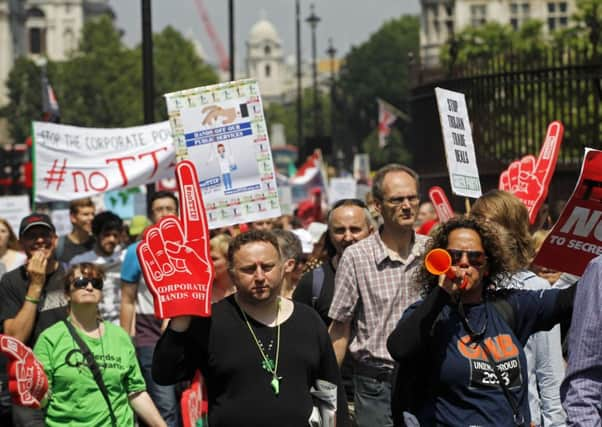Comment: In the dark over game-changing TTIP deal


The Transatlantic Trade and Investment Partnership – or TTIP, as it is known – has received relatively little coverage in the UK since discussions began last year between EU and US authorities. However, it is coming under increasing scrutiny as critics lobby for amendments to many of the anticipated terms within the deal.
The terms are “anticipated” because to a large extent they will not be made public until the deal is done. This has fuelled concerns that sparked a series of protests last week, culminating in yesterday’s “Day of Action” with anti-TTIP gatherings in London, Edinburgh, Glasgow and elsewhere.
Advertisement
Hide AdAdvertisement
Hide AdMeanwhile, the largest trade unions in the US and EU have issued demands to be met before they give the deal their backing.
High on their list is a call to drop special protection for foreign investors. This controversial mechanism, the investor-state dispute settlement, would allow foreign investors to sue governments that pass legislation which hampers trade or profits.
Union leaders also want assurances on the right to online privacy, a highly charged issue.
The drive to remove trade barriers has also raised concerns about the National Health Service, which Unite claims is at “unique risk” of being privatised. Business secretary Vince Cable has flatly denied such assertions, insisting that the NHS will always be there for anyone who needs it.
From there, the disquiet spreads to concerns that labour rights will suffer, food regulation could be weakened and environmental standards potentially undermined. In addition, some academics have claimed that TTIP’s much-vaunted cash bonanza is “vastly overblown”.
With so much hanging in the balance (supporters predict an extra £98 billion a year to the EU, with the UK’s share of that estimated at between £4bn and £10bn), it would make sense to pull out all the stops in building support for TTIP. But the best way to tackle the critics’ concerns – by making the negotiations public – seems less likely than a speedy resolution to the Crimean crisis.
Secrecy is de rigueur in trade talks, and TTIP is no exception. Most MEPs won’t get a meaningful look at the negotiating documents until it’s a done deal, and even less information trickles down to the members of their constituencies.
It is argued that such delicate negotiations are all but impossible if sensitive commercial information is made public. Not every detail need be served up for general consumption, but plenty of other international negotiations on issues such as climate change or intellectual property have been successfully concluded with transparency as the rule. TTIP would do well to take heed. «